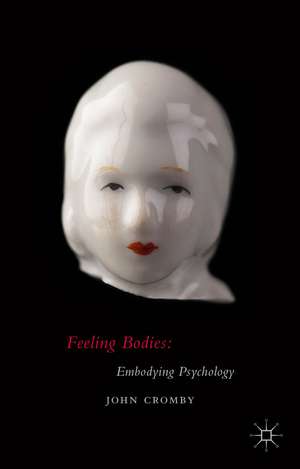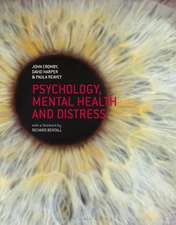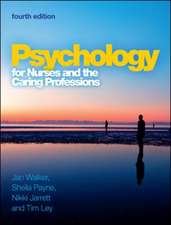Feeling Bodies: Embodying Psychology
Autor John Crombyen Limba Engleză Hardback – 16 iul 2015
Preț: 696.82 lei
Preț vechi: 819.79 lei
-15% Nou
Puncte Express: 1045
Preț estimativ în valută:
133.34€ • 142.58$ • 111.17£
133.34€ • 142.58$ • 111.17£
Carte tipărită la comandă
Livrare economică 18 aprilie-02 mai
Preluare comenzi: 021 569.72.76
Specificații
ISBN-13: 9781137380579
ISBN-10: 1137380578
Pagini: 221
Ilustrații: X, 221 p.
Dimensiuni: 140 x 216 x 14 mm
Greutate: 0.42 kg
Ediția:1st ed. 2015
Editura: Palgrave Macmillan UK
Colecția Palgrave Macmillan
Locul publicării:London, United Kingdom
ISBN-10: 1137380578
Pagini: 221
Ilustrații: X, 221 p.
Dimensiuni: 140 x 216 x 14 mm
Greutate: 0.42 kg
Ediția:1st ed. 2015
Editura: Palgrave Macmillan UK
Colecția Palgrave Macmillan
Locul publicării:London, United Kingdom
Cuprins
1. Introducing
2. Feeling
3. Relating
4. Experiencing
5. Researching
6. Believing
7. Exhausting
8. Maddening
9. Concluding
2. Feeling
3. Relating
4. Experiencing
5. Researching
6. Believing
7. Exhausting
8. Maddening
9. Concluding
Recenzii
'This book is not just timely, it's long-overdue. It weaves together a sophisticated, engaging argument that draws on philosophy, neuroscience and an array of psychology sub-fields to firmly locate feelings at the heart of an embodied psychology. It provides a majestic and broad account of the affective realm (including emotions, moods, affects and feeling) and its relevance to psychology, interrogating why this realm has been treated as relatively unproblematic (and under-explored) despite the 'affective turn' that has taken place elsewhere in the social sciences and humanities.
Cromby's writing sweeps the reader up and takes them through wide-ranging and convincing arguments that feelings are central to all of the diverse fields within psychology. Here feelings are simultaneously social and individual, related to ideologies as well as socialised experiences. He grounds his argument by considering the ways in which we might investigate and interrogate such an approach, using worked examples in health and clinical psychology (across 3 chapters). This demonstrates its value in enabling thorough re-conceptualizations of key psychological phenomena, from the biological to the social, which incorporate experience, the materiality of the body as well as material environments and circumstances. This inspiring account marks feelings out as a way to re-envision many key psychological concepts, including fundamental notions of personhood, embodiment, and embodied subjectivity. This book is essential reading for anyone who wants to move beyond dominant conceptualisations of the person as separated into individual/social, nature/culture, and body/mind dichotomies.' Antonia Lyons, Professor of Psychology, Massey University, New Zealand
Cromby's writing sweeps the reader up and takes them through wide-ranging and convincing arguments that feelings are central to all of the diverse fields within psychology. Here feelings are simultaneously social and individual, related to ideologies as well as socialised experiences. He grounds his argument by considering the ways in which we might investigate and interrogate such an approach, using worked examples in health and clinical psychology (across 3 chapters). This demonstrates its value in enabling thorough re-conceptualizations of key psychological phenomena, from the biological to the social, which incorporate experience, the materiality of the body as well as material environments and circumstances. This inspiring account marks feelings out as a way to re-envision many key psychological concepts, including fundamental notions of personhood, embodiment, and embodied subjectivity. This book is essential reading for anyone who wants to move beyond dominant conceptualisations of the person as separated into individual/social, nature/culture, and body/mind dichotomies.' Antonia Lyons, Professor of Psychology, Massey University, New Zealand
Notă biografică
John Cromby previously conducted research and teaching at the Universities of Nottingham and Bradford, and has experience of working in mental health, drug addiction, and learning disability settings. His work engages with the ways that bodies and social processes come together to produce experience, including experiences of distress. This has meant exploring topics including paranoia, clinical sadness, emotion and fear of crime, and experimenting with methods of jointly analysing textual data and embodied activity. He is a former editor of the journal Subjectivity.











![Promoting Psychological Well-Being in Children with Acute and Chronic Illness: A Step-By-Step Resource [With CD (Audio)]](https://i2.books-express.ro/bt/9781843109679/promoting-psychological-well-being-in-children-with-acute-and-chronic-illness.jpg)